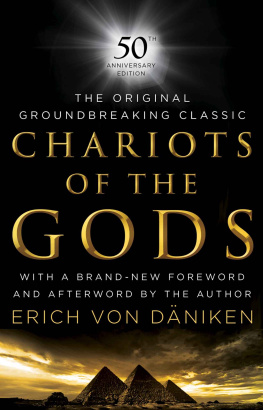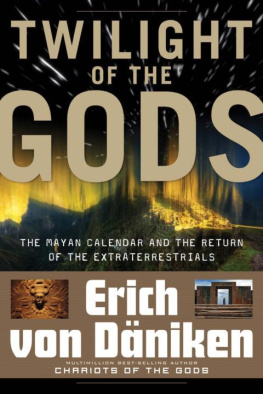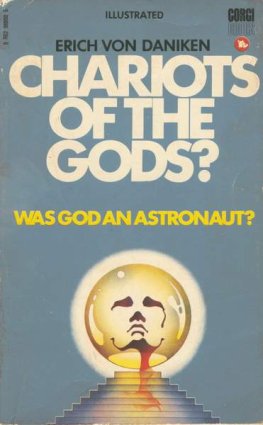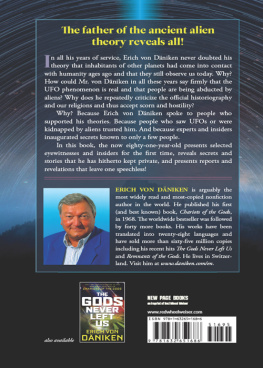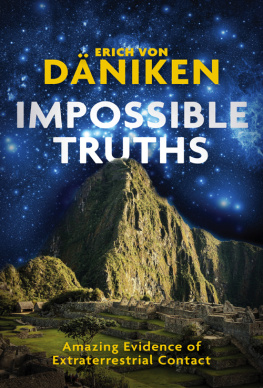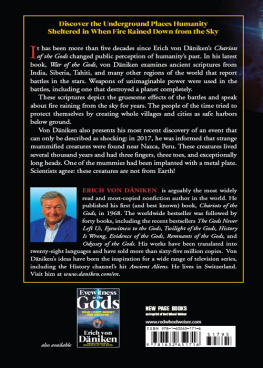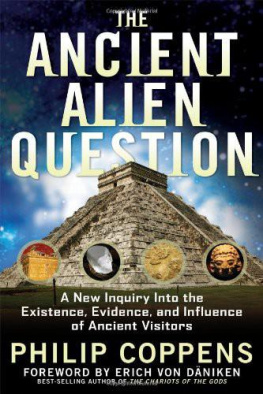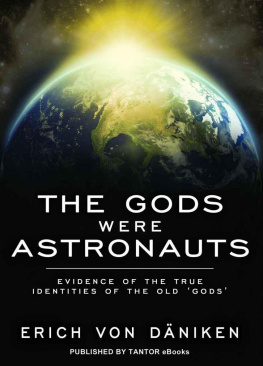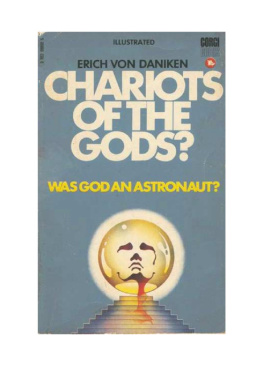Penguin Random House supports copyright. Copyright fuels creativity, encourages diverse voices, promotes free speech, and creates a vibrant culture. Thank you for buying an authorized edition of this book and for complying with copyright laws by not reproducing, scanning, or distributing any part of it in any form without permission. You are supporting writers and allowing Penguin Random House to continue to publish books for every reader.
BERKLEY is a registered trademark and the B colophon is a trademark of Penguin Random House LLC.
G. P. Putnams Sons edition / February 1970
G. P. Putnam / Berkley Medallion edition / April 1977
Foreword
Since the publication of Chariots of the Gods in February 1968, people around the world have asked me how this book came to be and what brought me to these crazy ideas. Here is the story:
I come from a deeply Catholic family in Switzerland, and my father considered it important that I receive a theologically based education. Thus, when I was sixteen, he placed me in the Collge Saint-Michel in Fribourg, Switzerland. This was a boarding school run by Jesuits. My view of God at that time was rather grandiose, but also unclearand remains so to this day. Yet, Godwho or what that actually wasat least had to be empowered with certain minimal characteristics, so I thought. The true God had to be free of mistakes; God cannot do anything wrong. He had to be omnipresent and would not need a vehicle that would take him from point A to point B. And, furthermore, God had to be timeless. A creature that had to perform experiments and then subsequently wait to see how they turn out could not be God. All of these were thoughts coursing through the confused mind of a sixteen-year-old.
During the theology courses, we had to translate texts in the Biblequite often from old Greek or Latin into German. And that is when the misery began. The God in the Old Testament used vehicles for his earthly visits. These were often described as smoke, fire, quakes, noise. Fallen angels or Sons of God descended from heaven to engage in sex with beautiful human daughtersas described in Genesis or the First Book of Moses. The biblical God performed experiments without knowing the outcome, and, even worse, he often erred. First, he created man and saw that it was good. Later on, however, he felt remorse that he had created man, and he was deeply troubled by it. Thus, he decided that the entire human race had to drown, with the exception of Noah and his family.
What kind of God is that? Doubts about my own religion began to plague me, and I wanted to know whether stories about God in other cultures were similar to our Judeo-Christian beliefs. For many years, I delved deeply into the story of creation within other religions. And, lo and behold, among the Indians, the Tibetans, the Egyptians, the Inca, the Maya, and the Aztecs, all gods descended from the vaults of heaven via smoke, fire, quakes, and noise. This, then, was the hour of birth for Chariots of the Gods.
After five years at the Jesuit school, I was drawn to gastronomy. It was not really anything unusual since my grandmother was in charge of a hotel restaurant, and Swiss gastronomy had a fine international reputation. I worked as a waiter, chef, barkeeper, and receptionist, and I studied at the hotel trade school. All throughout my hotel years, I worked intensively on my hobby: the search for the origin of the gods. I devoured a huge number of archaeological and theological works, traveled quite a lot, and visited excavation sites and temples in many foreign lands. I wrote small articles about my research and was pleased to have them published in a variety of magazines.
Concurrent with my hobby, my professional career began to take off, and in 1966 I became director of a first-class hotel in Davos, Switzerland. During my afternoons, I sat in a small room and typed a manuscript that would later become a worldwide bestseller.
First, though, difficulties began to arise. I sent the manuscript to about twenty-five publishing companies. Every one of them declined it. Almost regularly, letters landed on my desk with the usual comment: With regret... not suitable for our publishing firm... too speculative... antireligious... I knew that I was sitting on top of a volcano, but nobody seemed interested. One of my hotel guests was Dr. Thomas von Randow, Science Editor of the German weekly magazine Die Zeit. We chatted quite often at the bar about my book, and eventually he called a German publisher whom he had known for years. The man was editor-in-chief of the Econ Publishing Company in Dsseldorf. He thought he might try out my book in a small edition of about 2,000 copies. In February 1968, Chariots of the Gods made its debut.
The Swiss weekly magazine Die Weltwoche decided to print installments of the book, and this created an avalanche.
In a few weeks, more than 20,000 copies of the book were sold in Switzerland. The success crossed over into Germany and Austria. Within a year of its first appearance, Econ printed its thirtieth edition with a total of 800,000 copies. Month after month, this book appeared in other translations. The New York Times wrote that a new virusDnikenitishad erupted.
With the wave of success came criticism. As if a warm rain had descended, a series of anti-books started sprouting from the earth. Among them were a few monstrosities. Obviously, there were a few errors in Chariots of the Gods. As a young author, one is enthusiastic and gullible. Self-criticism is lacking. One often takes on the opinion of others, also from scientific books, only to learn later that the ideas of highly recognized scientists have in the meantime been refuted. Or, one is led to believe a serious travel guide, only to learn a year later that its opinions about a certain ruin were total nonsense. Thus, I came to write in Chariots about the Island Elefantine near Aswan in Egypt that the name was created because the island resembles the contours of elephants as seen from the air. This explanation was given to me at that location. In reality, the name of the island came about because elephants used to graze there. I also wrote about a pillar that stood in a temple in Delhi, India, that was made of an unknown metal. At that time, the temple guides told me that the pillar didnt rust. Was it created from an extraterrestrial alloy, I asked in Chariots. In the meantime, that piece of junk was rusting away.
Despite some of the erroneous data, no corner pillar of my think tank has been brought to collapse. And heres what the critics often overlooked: In Chariots of the Gods, there are 323 question marks. Questions are the opposite of assertions.

